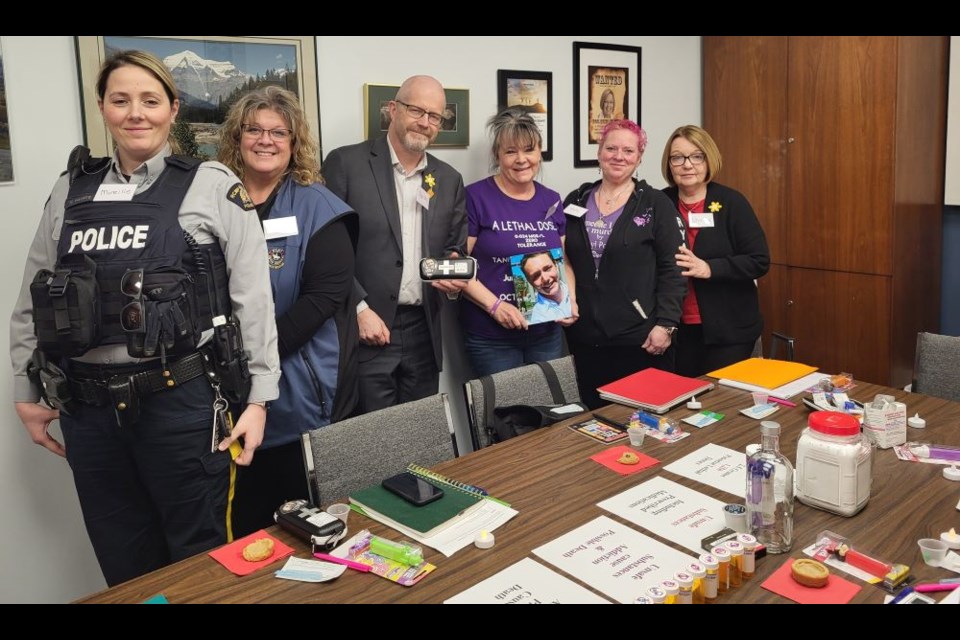At 15 he started using marijuana.
Ten years later, in 2019, registered nurse Michelle Miller lost her son Tanner to toxic drug poisoning.
“I am a mom of five, my oldest is 32 and my youngest is 19, and I have had a lot of teenagers in my house over the years and I am a really good listener now – I wasn’t before – but I am now,” Miller said. “I think it’s important for parents to listen to their kids and engage with them and talk with them about drugs.”
Miller said at the time it was very hard to understand drug use as her family did not use drugs or drink alcohol or smoke.
“So we were just an every day average family and our son was struggling,” Miller said about her second youngest son Tanner.
Miller said Tanner’s addiction ultimately progressed to methamphetamine, his drug of choice.
“So for 10 years our family lived in anticipatory grief – not knowing when, how or why our son was going to die,” she said.
Deep breath in.
“And in 2019 Tanner passed away on the streets of Vancouver.”
In 2021 Miller joined the traumatic loss support group at PG Hospice for individuals who are grieving the loss of someone who has died suddenly due to homicide, suicide, accident or toxic drug poisoning where she was one of 10 parents experiencing a similar loss to hers.
“All of our kids died from fentanyl that was added to their drug of choice – meth, cocaine, heroin - without their knowledge,” Miller said. “When you lose a child to drugs it’s a lot different than other kinds of losses because there is police involvement, a coroner’s report. All these different things are thrown at you over the next year.”
When Miller realized everyone’s child had died from fentanyl in the grief support group she decided to educate herself on illicit drugs.
“I’m a nurse - we use fentanyl in the hospital for conscious sedation during colonoscopies and it’s very well monitored,” Miller said. “They use it in dental offices - again very well monitored – I had never heard of illicit fentanyl – Never. Heard. Of. It. – didn’t even know it existed.”
Now that Miller was informed she needed to take action.
To help raise awareness about the toxic drug crisis, Miller who belongs to the group Broken Hearts of Fentanyl, presented a round table discussion at MLA for Prince George-Valemount Shirley Bond’s office Friday.
As a parent who lost her child, the focus of the discussion was how to keep children safe by educating parents.
Representatives sitting at MLA Shirley Bond’s table included a Prince George RCMP constable that is a school liaison officer focused on prevention, a city council member, RCMP victim services representative and a SD 57 representative.
The lives of more than 14,000 British Columbians have been lost to unregulated drugs since the public-health emergency was first declared by the BC government in April 2016.
And Miller said there are some things every parent needs to know about how easy it is to access illicit drugs and how very dangerous unregulated toxic drugs can be.
As the round table discussion progressed, facts were shared including those from the US Drug Enforcement Administration’s One Pill Can Kill campaign.
There is an emoji drug code used by drug traffickers to sell fake prescription pills commonly laced with deadly fentanyl and methamphetamine on social media and e-commerce platforms making them available to anyone with a smartphone.
Examples included symbols like a cookie means a big batch, a school bus means drop off at school, a car means drop off at home, a snowman means cocaine.
“It’s as easy as ordering a pizza delivery,” Miller said.
According to DEA lab testing six of every 10 pills with fentanyl contain a potentially lethal dose.
Whether it is a pill, powder or liquid you can’t see or taste fentanyl and only a few grains is all it takes to get a lethal dose.
“Tell your kids no powders, no pills when they head off to a party,” Prince George RCMP Constable Mirielle Haunts, school liaison officer focused on prevention, said. “This isn’t just people downtown who are dying, our young people – as young as 12 are now experimenting with drugs. That’s what I am seeing as the school liaison officer."
Haunts said people say marijuana is not a gateway drug but she doesn’t believe that’s true.
“I see youth medicate themselves whether it’s for depression or anxiety or any other issue,” Haunts said.
And when marijuana isn’t enough, they look for something stronger and that’s when they turn to illicit drugs, she added.
Discussion facilitator Miller used cookies placed before each participant around the table to demonstrate the randomness of the ingredients of fake pills created by drug traffickers to look like an authentic pill.
“Who has a cookie with no chocolate chips in it?” Miller asked. Those who raised their hands were safe from a lethal dose of fentanyl but still at risk of addiction.
Those with two chocolate chips, symbolizing the 2 milligrams of fentanyl it takes to potentially kill a person, could die from this one-time ingestion.
And the people who got cookies with 10 chocolate chips would die of toxic drug poisoning.
“Imagine making a batch of cookies and mixing the ingredients up in a blender – because that’s what drug dealers do, they use regular kitchen blenders – they have no idea what amount of fentanyl is in each pill – and that’s what’s killing our kids,” Miller said.
At the end of the round-table discussion MLA Shirley Bond thanked Miller for her presentation, acknowledging that Miller's activism was spurred by the tragic loss of her son, Tanner.
“You’ve given us a lot to think about,” MLA Shirley Bond said.



.png;w=120;h=112;mode=crop)